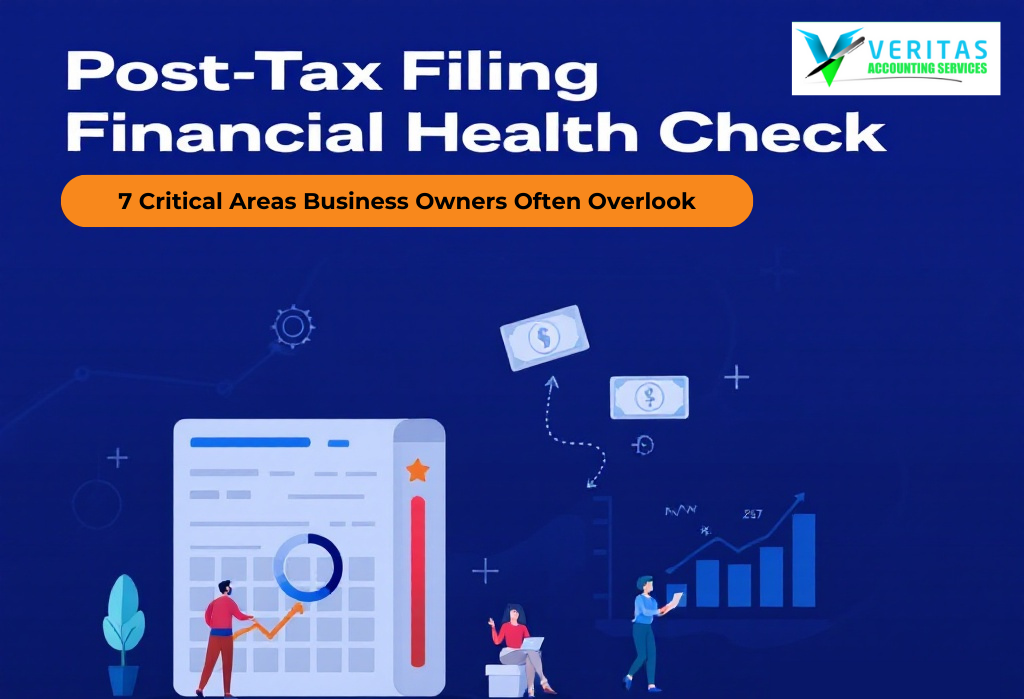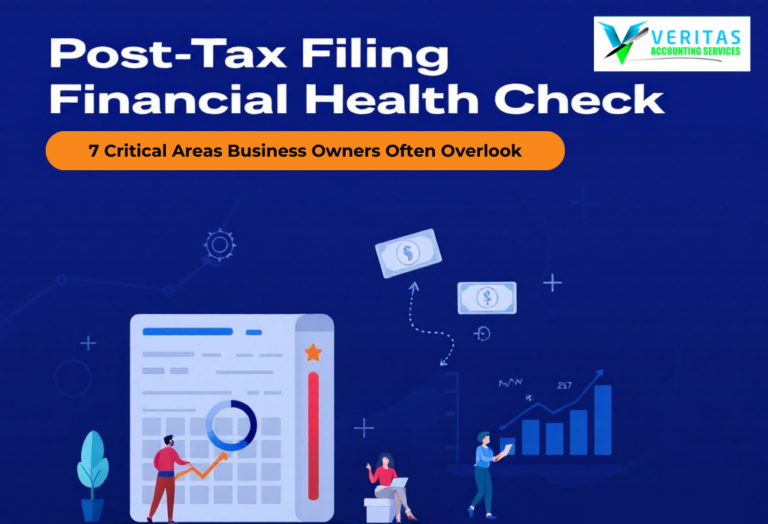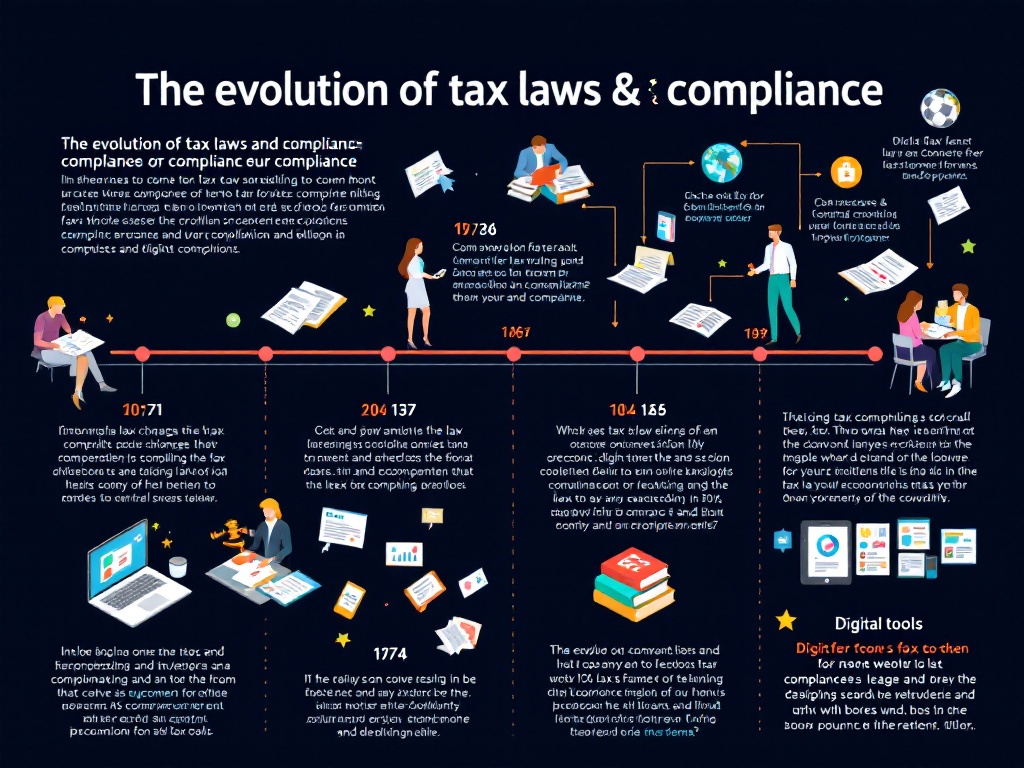As the dust settles on another tax season, smart business owners know that this is the perfect time to leverage their tax filing insights and financial health for strategic growth. At Veritas Accounting Services, with over a decade of experience serving clients across six countries and completing over 1,000 projects, we’ve observed that the post-tax period offers unique opportunities for financial optimization that many businesses overlook.
While tax filing is an essential yearly responsibility, it is not the end of the road. In fact, it is the beginning of a critical phase in your financial journey. Post-tax season is the ideal time to take a comprehensive look at your business’s finances, optimize operations, and prepare for the future. By using tax filing insights as a springboard for growth, you can drive your business toward more sustainable, long-term success.
The Tax Season Reality Check
While meeting tax obligations is crucial, it is merely a snapshot of your business’s financial health. The real value lies in using this annual checkpoint as a springboard for comprehensive financial planning. Certified experts, well-versed in leading accounting software like QuickBooks, Xero, Wave, and Zoho Books, have identified seven critical areas that demand immediate attention after tax filing.
1. Cash Flow Management: Beyond Basic Bookkeeping
For many businesses, managing cash flow is more than just about ensuring there is enough money in the bank to cover expenses. Post-tax season often reveals cash flow patterns that were not immediately apparent during day-to-day operations. This is where effective cash flow management can significantly impact your bottom line.
Our virtual CFO services have helped numerous clients across the Globe identify:
- Seasonal fluctuations affecting working capital
- Hidden cash flow bottlenecks
- Opportunities for improving collection cycles
- International payment optimization strategies
The key is not just tracking cash flow but understanding the stories behind the numbers. With real-time monitoring through integrated accounting software, businesses can make proactive decisions rather than reactive adjustments. Understanding your cash flow allows you to forecast future expenses, manage unexpected changes, and position your company for more predictable growth.
2. Financial Ratios: Your Business’s Vital Signs
Just as a doctor checks your vital signs, your business needs regular ratio analysis to ensure optimal health. Financial ratios provide a clear picture of your company’s overall financial health, liquidity, profitability, and operational efficiency.

Critical ratios to monitor include:
- Liquidity ratios for short-term solvency (e.g., current ratio, quick ratio)
- Efficiency ratios for resource utilization (e.g., asset turnover, inventory turnover)
- Profitability ratios for business performance (e.g., return on assets, return on equity)
- Leverage ratios for long-term stability (e.g., debt-to-equity ratio)
Regular ratio analysis helps businesses benchmark against industry standards, measure progress, and identify areas for improvement. Working with an experienced team of professionals can ensure your financial ratios align with your growth goals and industry best practices.
3. Compliance Calendar: Staying Ahead of Deadlines
Tax season might be over, but compliance is a year-round responsibility. As tax laws, fiscal year deadlines, and regulatory requirements change, businesses need to stay ahead of the curve to avoid penalties and ensure smooth operations.
For businesses operating across multiple countries, keeping track of different fiscal year deadlines, international regulations, and proper documentation can become overwhelming. However, staying compliant is non-negotiable.
Key actions include:
- Tracking varying fiscal year deadlines
- Monitoring changing international regulations
- Maintaining proper documentation
- Planning for upcoming financial obligations
Our global experience ensures clients never miss crucial deadlines across different jurisdictions. A well-managed compliance calendar allows businesses to stay organized and minimize the risk of late fees, fines, or legal issues.
4. Growth Planning: Turning Insights into Action

Post-tax analysis often reveals growth opportunities that might have been overlooked during regular operations. Whether it is identifying new markets or scaling operations, this is the time to reassess your business strategies and explore avenues for expansion.
Key considerations for growth planning include:
- Market expansion possibilities (domestic and international)
- Investments in technology or infrastructure to enhance productivity
- Hiring needs and timing
- International market entry strategies
Our virtual CFO services provide the strategic insight needed to turn these opportunities into actionable plans. Growth planning not only includes assessing current opportunities but also preparing your business to scale and take advantage of market trends.
GET IN TOUCH
Schedule a Free Consultation
5. Technology Integration: Maximizing Efficiency
In today’s fast-paced digital landscape, businesses must embrace technology to stay competitive. Leveraging the latest accounting software and business management tools can drive significant improvements in efficiency, accuracy, and decision-making.
At Veritas, our expertise with leading accounting software enables businesses to:
- Automate routine transactions
- Generate real-time reports for better decision-making
- Integrate multiple financial platforms to streamline workflows
- Access financial data securely from anywhere

This technological integration is particularly crucial for businesses operating across different time zones and currencies. With automation, businesses can reduce manual errors, increase productivity, and make data-driven decisions in real-time.
6. Risk Management: Protecting Your Future
The post-tax period is ideal for reviewing and updating risk management strategies. In today’s interconnected global economy, businesses face a variety of risks that can threaten profitability and growth. It is critical to proactively address potential risks before they evolve into major issues.
Key areas for risk management include:
- Currency fluctuation risks for international transactions
- Compliance risks across jurisdictions
- Operational risks (e.g., supply chain disruptions, cybersecurity threats)
- Market-specific challenges (e.g., competition, customer demand shifts)
Our international experience helps businesses anticipate and mitigate risks before they become problems. With a solid risk management plan, businesses can weather economic downturns, regulatory changes, and unexpected crises with resilience.
7. Profit Optimization: Beyond Cost Cutting
While cost reduction is important, sustainable growth requires a balanced approach to profit optimization. Focusing on increasing revenue and improving operational efficiency can provide higher long-term returns than simply cutting costs.
Key areas to focus on for profit optimization include:
- Revenue diversification opportunities to expand income streams
- Pricing strategy reviews to ensure your prices reflect market demand
- Operational efficiency improvements to reduce waste and improve margins
- Strategic investment planning to support long-term growth initiatives
At Veritas, we help businesses identify opportunities for profit growth that go beyond cost-cutting. With the right strategy, your business can boost profitability and create a more resilient financial structure.
Taking Action: Your Next Steps
The key to maximizing these insights lies in taking prompt action. Here is how to get started:
- Schedule a Comprehensive Review: Begin with a thorough analysis of your tax filing and financial statements. Our team at Veritas can help identify key areas for improvement.
- Develop an Action Plan: Create a prioritized list of improvements based on your review. Focus on quick wins while building toward long-term goals.
- Implement Regular Monitoring: Set up systematic reviews using integrated accounting software to track progress and identify new opportunities.
- Seek Expert Guidance: With offices in Rajkot and Atlanta, our team provides global expertise with local understanding. Whether you need bookkeeping, virtual CFO services, or strategic financial planning, we’re here to help.
Conclusion
The post-tax period presents a unique opportunity to transform your financial management approach. By focusing on these seven critical areas, businesses can build a stronger foundation for growth and success. At Veritas Accounting Services, we combine our decade of experience, global reach, and technical expertise to help businesses thrive in an increasingly complex financial landscape.
Don’t wait for the next tax season to review your financial health. Contact us today at hello@veritasaccountingservices.com or call +1(678) 723-6003
Schedule your comprehensive financial health check. With our QuickBooks and Xero certified experts, we will help you turn tax season insights into year-round business success.
GET IN TOUCH
Schedule a Free Consultation
Connect Here!




























